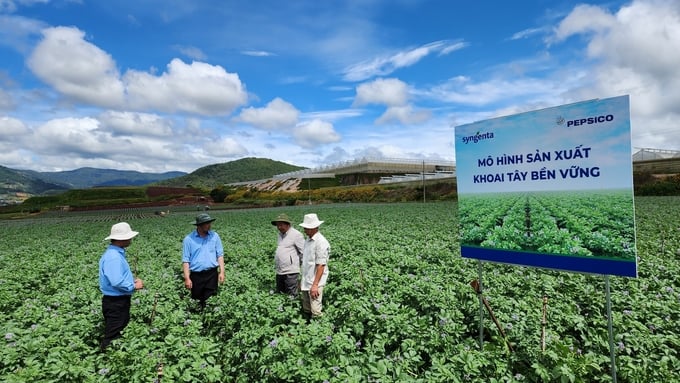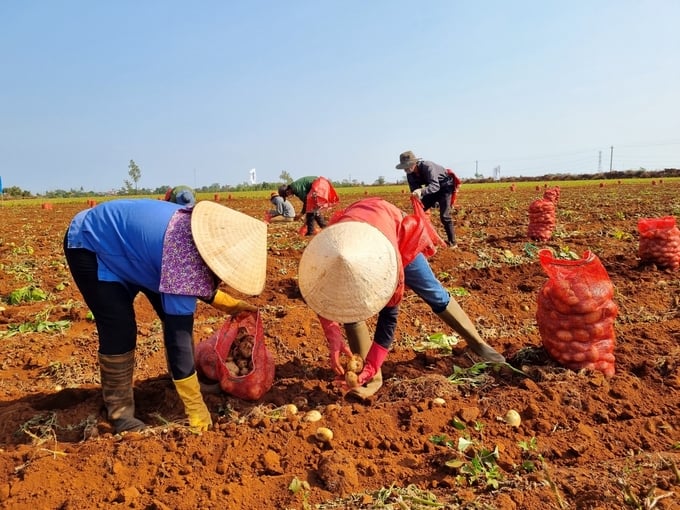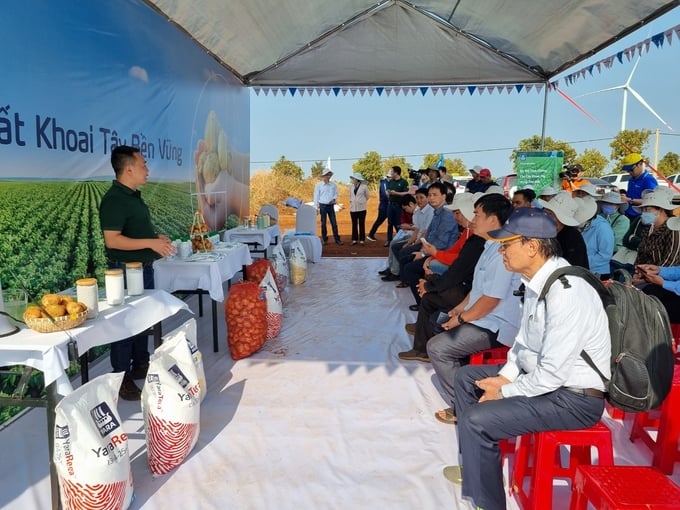November 27, 2025 | 21:29 GMT +7
November 27, 2025 | 21:29 GMT +7
Hotline: 0913.378.918
November 27, 2025 | 21:29 GMT +7
Hotline: 0913.378.918
On March 16, PepsiCo, Syngenta, Yara, USAID and Resonance co-organized the“Sustainable potato production-consumption model: Harvest festival” in Bau Can commune, Chu Prong district, Gia Lai. Over 200 farmers in the Central Highlands provinces were invited. Through the harvest festival, farmers were able to witness firsthand the actual yield of the potato fields that applied the sustainable farming model in Gia Lai, as the achieved yield is much higher compared to previous crops.
Potatoes in particular and tubers in general are important crops in Vietnam's agricultural industry. In previous years, potatoes had a large production area, sometimes reaching over 100,000 ha. But now only about 1/5 of the above-mentioned area is left, while there is still an enormous demand in the consumption market. It is mainly due to the great pressure of pests and diseases on potato plants. Managing pests and diseases while improving the yield and quality of commercial potatoes is always a complex problem. It is also one of the reasons why farmers are not interested in this crop, thus the decline in potato production area in Vietnam in recent years.

Syngenta and PepsiCo partner to develop sustainable potatoes. Photo: Dang Lam.
Facing such a challenge, Syngenta and PepsiCo, co-leaders of the fruit and vegetable working group under the Partnership for Sustainable Agriculture in Vietnam (PSAV) have cooperated with partners such as Yara, Minosatek/Khang Thinh together with a number of NGOs such as USAID, Resonance since 2019 to implement a strategic cooperation model of sustainable potato production in Vietnam. This is also a model of linking points in agriculture that has received support from departments, sectors and localities across the country.
Potato farmers participating in the project will be supported with technical advice such as new seed varieties, farming techniques, effective and safe methods to use pesticides and fertilizer, water-saving irrigation technologies (mist, drip), application of mechanization in sustainable potato production, etc. All of these advance technologies have been proven effective in practice. At the same time, businesses have taken the initiative to create linkages, supply input materials and provide support to ensure output for farmers.

Potato growers are supported in production and product consumption. Photo: Tuan Anh.
Facing such a challenge, Syngenta and PepsiCo, co-leaders of the fruit and vegetable working group under the Partnership for Sustainable Agriculture in Vietnam (PSAV) have cooperated with partners such as Yara, Minosatek/Khang Thinh together with a number of NGOs such as USAID, Resonance since 2019 to implement a strategic cooperation model of sustainable potato production in Vietnam. This is also a model of linking points in agriculture that has received support from departments, sectors and localities across the country.
Potato farmers participating in the project will be supported with technical advice such as new seed varieties, farming techniques, effective and safe methods to use pesticides and fertilizer, water-saving irrigation technologies (mist, drip), application of mechanization in sustainable potato production, etc. All of these advance technologies have been proven effective in practice. At the same time, businesses have taken the initiative to create linkages, supply input materials and provide support to ensure output for farmers.
After nearly 4 years of building and developing potato models, the crop’s area, output as well as income of people participating in the project have noticeably improved. In the 2018-19 crop year, the potato area only reached 400 ha with nearly 600 farmers participating, but in the period of 2021-2022, the potato cultivation area tripled to 1,269 ha with the average potato yield reaching 30-35 tons/ha, even up to 50 tons/ha.

People are very eager to participate in the sustainable potato production linkage model. Photo: Dang Lam.
One notable thing is that in order to achieve the above-mentioned breakthrough in potato productivity, a series of smart solutions have been applied to the production chain. Syngenta presents an advanced method of spraying pesticides, which reduces the number of pesticide sprays by up to 2 times compared to farmers' common practices. This not only reduces labor costs but also significantly reduces the amount of water and pesticides released into the environment.
Irrigation system through applications (apps) is also applied to production, helping farmers know the exact amount of water evaporation daily and adjust irrigation time based on actual data from the weather measurement station, thereby helping farmers reduce the amount of irrigation water by nearly 18%. At the same time, fertilizing is also done through this watering system, helping farmers save up to 11% of the chemical fertilizers needed.
The model has initially formed the potato production and consumption linkage in the provinces of Lam Dong, Dak Lak, and Gia Lai, serving as a basis for expanding potato production to new production areas in Vietnam. The model’s success contributes to the improvement of product value, land use coefficient per unit area, crop rotation, land improvement, and income for people.
With practical effects gained from the model, in the 2022-2025 period, stakeholders in the link chain will continue to implement and expand the project to develop a model potato farm in several Central Highlands provinces such as Lam Dong, Dak Lak and Gia Lai. The project sets the goal of expanding the production scale to over 2,000 ha with more than 1,000 farmers participating in the project, aiming to bring about real profits after cultivation and improve adaptability to climate change, contributing to Vietnam’s effort of protecting the environment.
Translated by Samuel Pham

(VAN) According to Mr. Vo Minh Thanh, Director of the Tay Ninh Department of Agriculture and Environment, Resolution 57 has created a new development pathway for the locality, shifting from traditional toward modern agriculture.
/2025/11/26/4909-2-154329_878.jpg)
(VAN) Pearl grouper farming in HDPE cages not only delivers economic efficiency but also contributes to protecting the environment, creating jobs, and promoting marine-based experiential tourism.

(VAN) The model of making a living under the forest canopy through the agroforestry system in Van Son commune, Bac Ninh province, is expected to generate an annual income of approximately VND 30 million/ha.

(VAN) Many enterprises in Can Tho are harnessing natural energy and reducing greenhouse gas emissions in their production processes, thereby contributing to the promotion of a sustainable green transition.
/2025/11/24/3536-2-112800_176.jpg)
(VAN) Dong Nai now has tens of thousands of hectares of forests certified for sustainable management, and this area will continue to be expanded in the coming period.

(VAN) Vinh Ha hamlet (Dai Xuyen commune, Hanoi) is shifting away from small-scale farming as households adopt bioscurity into their breeder chicken models.

(VAN) Heavy rains make aquatic species more vulnerable to disease. Proactive water management and high-tech systems help farmers prevent outbreaks and protect yields.